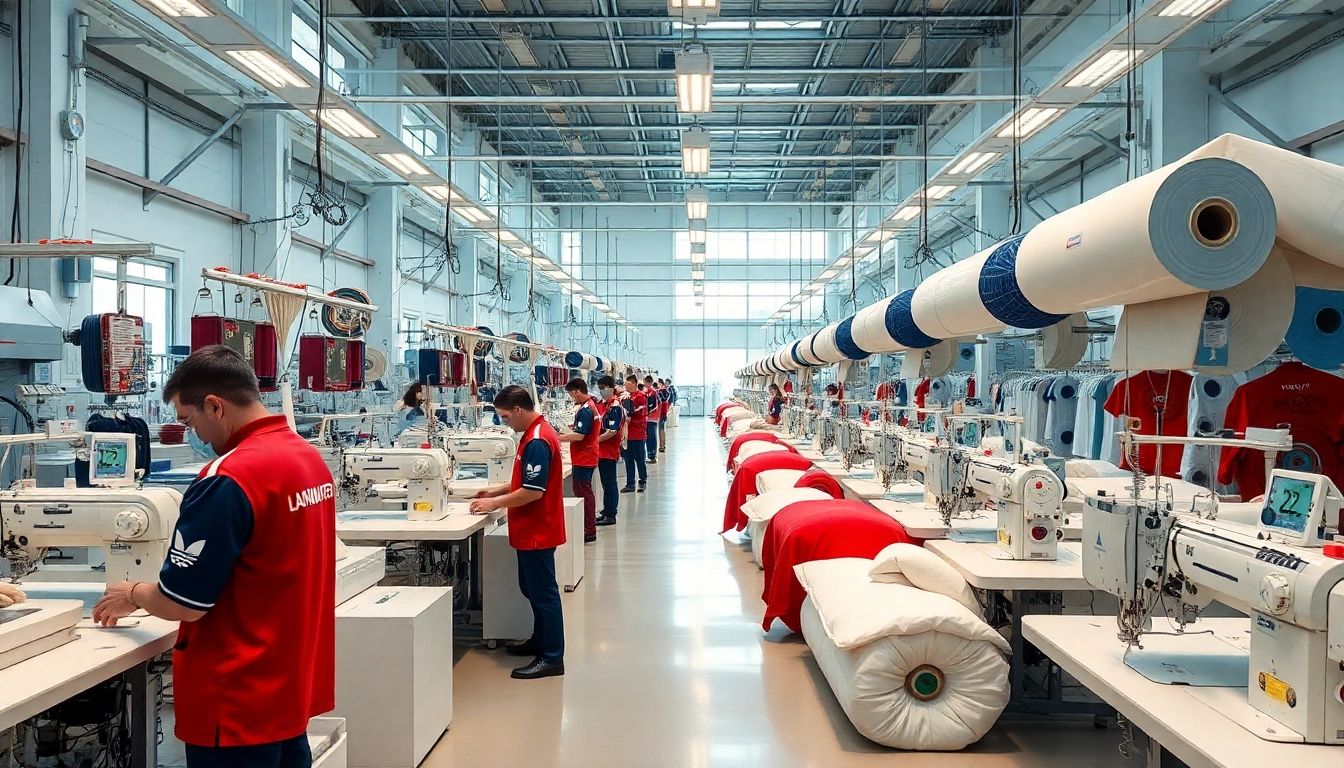Top Clothing Manufacturers in Pakistan Offering Custom Sportswear & Private Label Solutions

Introduction to Clothing Manufacturers in Pakistan
Pakistan has established itself as a global hub for the manufacturing of high-quality apparel, driven by a combination of skilled labor, cost-effective production, and advanced infrastructure. As one of the world’s largest apparel exporters, Pakistan’s clothing industry encompasses a broad spectrum of segments, including casual wear, sportswear, technical apparel, and luxury fashion. The country’s strategic geographic location and proximity to major markets in the Middle East, Europe, and North America further solidify its position in the global supply chain.
Within this thriving industry, Clothing Manufacturers in Pakistan play a pivotal role, especially in the manufacturing of custom and private label sportswear that meets international standards. These manufacturers cater to startups, established brands, and international companies seeking reliable, scalable, and innovative production partners. The competitive edge of Pakistani clothing manufacturers lies in their ability to deliver superior quality at affordable prices, coupled with flexible MOQ requirements and swift turnaround times.
Overview of the Pakistan Apparel Industry
The Pakistani apparel industry is characterized by its diversified product range, from basic cotton T-shirts to complex technical sportswear. The industry is strongly supported by a robust network of textile mills, competent manufacturing units, and advanced apparel technology. Sialkot, Lahore, Karachi, and Faisalabad serve as key hubs, each specializing in different segments such as sportswear, formal garments, or luxury attire.
Recent trends show a shift towards sustainable manufacturing practices and customization capabilities, aligning with global consumer demands for eco-friendly and personalized products. Furthermore, investment in automation, computerized embroidery, sublimation printing, and cutting-edge finishing techniques have helped Pakistani manufacturers enhance product quality, speed, and design innovation.
Key Players and Market Trends
The market features prominent manufacturers like ZK International, Axen Apparel, and Tack Apparel, each with extensive export experience and a focus on private labeling. These companies have evolved with the industry, emphasizing small MOQ orders, comprehensive customization, and eco-conscious production lines.
Current market trends include an increased demand for athleisure, functional sportswear, and youth-oriented apparel. The global shift towards health consciousness and active lifestyles amplifies the need for innovative sportswear solutions—leading to bespoke products that incorporate performance fabrics, moisture-wicking technology, and stylish designs. Another prominent trend is the rise of private label manufacturing, which allows brands to maintain unique identities while benefitting from Pakistan’s manufacturing prowess.
Importance of Custom and Private Label Manufacturing
Custom and private label manufacturing empower brands to differentiate themselves in competitive markets. By collaborating with Pakistani clothing manufacturers, brands can create exclusive product lines that reflect their unique style, quality standards, and branding messages. This approach offers flexibility in design, fabric choice, and packaging, enabling companies to quickly adapt to market trends.
Moreover, private label services facilitate cost-effective production, especially for startups and small businesses with limited budgets. A significant advantage is the ability to order in low quantities—sometimes as low as 50 pieces per style—reducing inventory risk and allowing rapid market testing. This agility positions Pakistan as one of the most attractive countries for private label sportswear manufacturing.
Choosing the Right Clothing Manufacturer for Your Brand
Factors to Consider: Quality, Price, and Turnaround
When selecting a manufacturing partner, brands must weigh several critical factors. First, quality assurance is non-negotiable; credible manufacturers adhere to international compliance standards, employ rigorous quality checks, and use high-grade fabrics and materials. Price competitiveness is equally essential, especially for emerging brands seeking to maximize margins. Pakistan’s manufacturers are renowned for offering competitive rates without sacrificing quality.
Turnaround time is another decisive factor. Leading manufacturers invest in efficient workflows, advanced machinery, and supply chain management to ensure on-time delivery. This reliability allows brands to plan production schedules, promotional campaigns, and inventory replenishment effectively.
Private Label and OEM Services Explained
Private label (or white label) manufacturing involves producing ready-to-brand products that companies can easily customize with their labels, tags, and packaging. OEM (Original Equipment Manufacturer) services offer broader production capabilities, including product design, fabric sourcing, and full customizations. Both options enable brands to build unique identities while leveraging the manufacturer’s expertise and infrastructure.
How to Evaluate Manufacturing Capabilities
Evaluating capabilities involves reviewing a manufacturer’s portfolio, internal processes, certifications, and client testimonials. Key indicators include in-house sampling facilities, modern cutting and sewing equipment, advanced printing and embroidery technology, and a flexible MOQ policy. Visiting the facility or requesting product samples can provide insights into craftsmanship and quality control procedures. Transparent communication about lead times, pricing, and after-sales support further aids decision-making.
Benefits of Partnering with a Leading Clothing Manufacturer
Customization Options: Fabrics, Styles, and Branding
Top manufacturers offer extensive customization options, including fabric selection—such as moisture-wicking polyester, breathable mesh, or eco-friendly organic cotton—styles, colors, and branding. Through techniques like sublimation, screen printing, and embroidery, brands can integrate logos, slogans, and unique designs effectively. This level of personalization helps brands establish a distinctive market position and enhance consumer loyalty.
Quality Assurance and Compliance Standards
Leading manufacturers comply with international standards such as ISO, OEKO-TEX, and WRAP certifications. These ensure safety, environmental responsibility, and fair labor practices. Regular quality audits and in-house testing protocols minimize defects, enhance durability, and meet global consumer expectations.
Cost-Effective Production and Low MOQ Advantages
One of Pakistan’s significant advantages is offering low minimum order quantities (MOQs), often starting at just 50 pieces per style or color, facilitating small batch testing and brand development. Competitive manufacturing costs, combined with bulk sourcing of fabrics and efficient labor, lead to highly affordable pricing. This combination appeals especially to startups and rapid-growth brands seeking quick market entry.
Manufacturing Processes & Technology
Cut & Sew Techniques for Unique Designs
Advanced cut and sew techniques provide flexibility in design and fit, enabling brands to craft bespoke products that stand out. Precision cutting with laser or computerized systems ensures minimal fabric wastage and perfect alignment. Detailed sewing, tailored to specific fabric characteristics, guarantees durability and aesthetic appeal, which is crucial for activewear needing high-performance qualities.
Advanced Printing & Embroidery Technologies
State-of-the-art sublimation printing allows full-color, all-over designs that are vibrant and long-lasting. All-over screen printing offers high-quality, cost-effective branding for large runs, while custom embroidery adds a premium feel to logos and decorative elements. In-house digitizing services and multi-head embroidery machines ensure quick turnaround and consistency across batches.
Eco-Friendly and Sustainable Manufacturing Practices
Sustainable practices are increasingly essential in the global apparel industry. Pakistani manufacturers are adopting eco-conscious methods, such as using organic fabrics, water-based inks, and waste recycling systems. Certifications like GRS (Global Recycled Standard) validate these efforts, enabling brands to market their products as environmentally responsible.
How to Start Your Clothing Brand with a Trusted Manufacturer
Design Development and Fabric Sourcing
The process begins with design conceptualization, often supported by experienced fashion designers. Selecting appropriate fabrics aligned with product performance and sustainability goals is vital. Many manufacturers offer fabric development services with minimums starting as low as 300 kilograms per color, ensuring flexibility and affordability.
Sample Creation & Quality Checks
Prototyping is critical to refine fit, style, and quality before mass production. Qualified manufacturers produce samples that undergo rigorous testing—checking stitching durability, fabric behavior, printing quality, and overall craftsmanship. Approvals at this stage minimize risks of defects in bulk orders.
Shipment, Delivery, and Post-Production Support
Once approved, the entire order progresses through cutting, sewing, printing, embroidery, and final inspection. Items are then carefully packed in branded or neutral packaging based on client preferences. Efficient logistics ensure timely delivery, with many manufacturers offering door-to-door shipping and tracking services. Post-sales support includes handling defects, reorders, and future collaboration opportunities.


